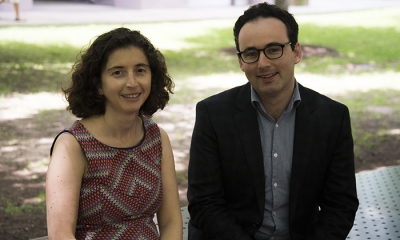An assistant professor in the Department of Mathematics has received a prestigious Faculty Early Career Development (CAREER) award from the National Science Foundation, making him the second member of his department — and his household — to win the award in the last year.
The NSF gives CAREER awards to promising junior faculty to promote innovation and support further research. The award comes with five years of funding, and CAREER awardees are often candidates for elite Presidential Early Career Scholars awards. Fewer than 1 in 5 top scientists and mathematicians applying for the awards receive one, and only about 400 researchers nationwide receive NSF CAREER support.
The University of Texas at Austin's Tim Perutz was awarded one of these grants this year, while his wife, Mirela Ciperiani, also an assistant professor in mathematics, won the award last year.
 Perutz’s research focuses on a field of geometry called “mirror symmetry,” an extension of string theory. He and his collaborators have worked out a new, satisfying explanation for how specific numbers arise from previously inexplicable string theory calculations, opening the door for advances in particle physics. In physics, string theory is referred to as “the theory of everything.”
Perutz’s research focuses on a field of geometry called “mirror symmetry,” an extension of string theory. He and his collaborators have worked out a new, satisfying explanation for how specific numbers arise from previously inexplicable string theory calculations, opening the door for advances in particle physics. In physics, string theory is referred to as “the theory of everything.”
Ciperiani’s mathematical interests focus on algebraic number theory and arithmetic algebraic geometry. Number theory has many applications and it proves especially useful in producing efficient numerical calculations in computers.
Although the pair consider their work worlds apart, they have shared a certain kinship through the grant application process. “It’s great to be able to talk through things like grant applications with her,” Perutz says. “There have been times when she’s very helpful in explaining arithmetical aspects of my own research.”


















Comments